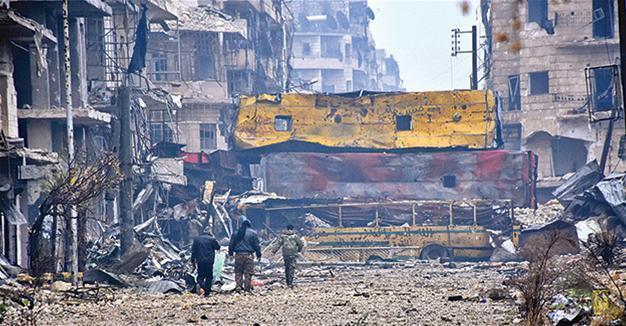Ankara blames Assad for failed Aleppo truce
ANKARA

AFP photo
Ankara has blamed the Syrian government and its supporters for hampering the implementation of a cease-fire deal that would allow civilians and fighters to leave Aleppo.Turkey was talking to Russia and Iran to try to ensure the evacuation, as air strikes and heavy shelling on Dec. 14 threatened to scupper the deal, while Tehran was said to have imposed new conditions on the truce deal.
The cease-fire collapsed after Syrian forces opened fire, Turkish President Recep Tayyip Erdoğan said, adding that he would speak with Russian President Vladimir Putin on Dec. 14 to salvage the cease-fire deal, which would allow civilians and rebel fighters to be evacuated from the city.
“This cease-fire, which has been declared following an initiative and efforts by Turkey, could be a last hope. The humanitarian corridor should be opened without any blocking and sabotage,” he told village heads on Dec. 14.
“We were hoping that a process of evacuation had begun for civilians and opposition from east Aleppo as a result of negotiations that I personally followed; unfortunately missiles have begun to be launched again. Therefore, we remain cautious,” the president said.
He also hit back at the United Nations for its failure to create a safe zone inside Syria to shelter Syrian refugees, and said Turkey would host those fleeing from Aleppo if necessary.
“O, United Nations, where are you?” Erdoğan asked. The president said Turkey had completed preparations for civilians to be evacuated from Aleppo to the western Syrian city of Idlib near the Turkish border. “We are also ready to embrace those who will come to Turkey,” Erdoğan said.
Turkey, Russia and rebel groups on Dec. 13 confirmed an agreement had been reached for civilians and opposition fighters to leave Aleppo, Syria’s second city. The deal was reached in talks “conducted in the field,” in Syria, a Turkish diplomat told the Hürriyet Daily News.
There was “harassment fire” in eastern Aleppo throughout the night despite a cease-fire deal being struck, Turkish Foreign Minister Mevlüt Çavuşoğlu told reporters on Dec. 14. Çavuşoğlu had phone talks with his Russian, U.S. and Iranian counterparts in the afternoon.
“We now see that the [Syrian] regime and some separate groups are trying to prevent this [agreement]. The evacuation could not take place in the full sense,” he said.
“We have not tested the practicality of the deal yet. We understand that the concept of the cease-fire is being observed to a degree, which is pleasing. But the movement of buses from Aleppo to Idlib has not begun. We understand that they are selecting the wounded and the elderly to move in the buses,” said a senior Turkish official, speaking on condition of anonymity.
The first civilians will be evacuated from the city before lightly armed opposition members, according to the official.
If the deal is accomplished, some of the Syrian opposition members evacuated from Aleppo will join the Euphrates Shield operation aiming to seize al-Bab in Syria. Some Syrian opposition fighters, who had previously left Aleppo, have already participated in the Turkish-backed forces to the west of al-Bab, sources told the Daily News.
While Turkey blamed the Syrian army for the failure of the cease-fire, the Russian Defense Ministry said on Dec. 14 that the Syrian army had resumed its assault in eastern Aleppo after rebels broke the truce.
The ministry said its military monitors in Syria had organized the evacuation of fighters from the city by bus, a process that was supposed to begin at 4 a.m. GMT.
But the convoy of civilian buses gathered in the Salaheddin neighborhood came under fire from rebel territory after the fighters “regrouped and re-launched hostilities” in an attempt to break through Syrian positions to the northwest, the ministry said.
Meanwhile, a U.N. official said that Iran wanted a simultaneous evacuation of wounded from the Shiite Muslim villages of Foua and Kefraya that are besieged by rebels.
“Apparently, the Iranians have conditions on simultaneous evacuation from Fuaa and Kefraya,” the official said, Reuters reported.
A spokesman for the Nour al-Din al-Zinki group, communicating with journalists on a messaging group, said the “Iranian sectarian militias have foiled the besieged Aleppo truce... requiring new files in their own special interests.”
The al-Zinki spokesman said the cease-fire agreement had been between the rebels and Russia and did not include Iran.
Iran supports some Shiite militias that are fighting alongside the Syrian army, including the Lebanese Hezbollah group and the Iraqi group Harakat al-Nujaba.
















